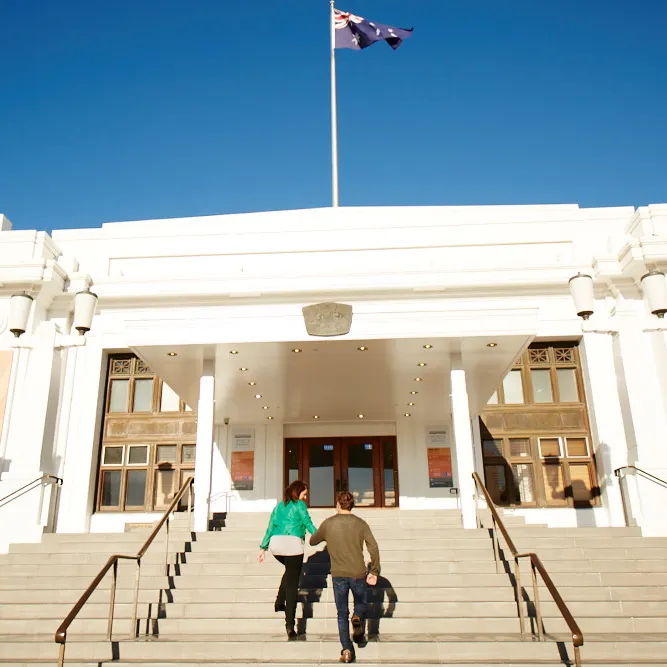Tune in to history in the House of Representatives Chamber
Hear the Chamber come alive with the announcement of the Second World War, the controversial dismissal of the Whitlam government, a reflection on women in parliament and a final vote of thanks to those who worked tirelessly for the parliament.
House of Representatives chamber audio guide
0:00
Speaker: The Honourable Prime Minister.
Mr Hawke: Thank you, Madam Speaker. I move that this House extends its thanks to all those former and present members and staff who have contributed to the work of the House of Representatives in this place since the 9th of May 1927, and places on record its appreciation of their contribution to parliamentary democracy in Australia ...
Narrator: On 3 June 1988 the House of Representatives sat for the final time in this Chamber. Prime Minister Bob Hawke gave a vote of thanks to the many people who had contributed to the work of the House since its first sitting in 1927. The Chamber was filled with elected members, with the government sitting to the right of the Speaker and the opposition directly across from them. Ministers and shadow ministers had front-row seats.
The architect of Old Parliament House, John Smith Murdoch, put a lot of thought into the layout of the House of Representatives Chamber. Informed by other parliaments, he arranged the politicians in a horseshoe shape, all focused on a central table with the Speaker at its head.
The Speaker directed proceedings seated on a replica of the Speaker’s Chair in the British parliament, a substantial gift from the UK branch of the Empire Parliamentary Association.
Other signifiers of the British origin of the House of Representatives become evident as you look around the Chamber. Notice the lustrous green of the leather, carpet and curtains that echo the House of Commons. Other than the finely detailed oak used in the Speaker’s Chair, all the timbers are local with the central table, benches, desks and panelling crafted from Australian blackwood.
At the central table, the Clerks help the Speaker keep order and the Hansard reporters rapidly record the parliamentary debates.
The shiny gold mace that sits at the end of the table symbolises the authority vested by the Monarch in the Speaker, and the despatch boxes were a gift from the Duke of York when he visited in 1927 to open the building. The volumes of legislation, parliamentary debates and the reference books and minutes signify the parliamentary business at hand.
Overlooking the Chamber on 4 sides are observation galleries reserved for the press and public.
Many important social and political events occurred in this Chamber, including one in May 1945 when Acting Prime Minister Ben Chifley stood to announce that Germany had surrendered.
Speaker: The Honourable JB Chifley.
Mr Chifley: Mr Speaker, I ask leave of the House to make a statement on the surrender of Germany.
Speaker: Is leave granted?
Members: Aye.
Speaker: Leave is granted.
Mr Chifley: Mr Speaker, it is with great pleasure I announce to, to the House the complete defeat of Germany.
Members: Hear, hear.
Mr Chifley: That pleasure, Mr Speaker, is tinged with regret that John Curtin, the prime minister of this country, who has contributed so much in this war effort, is not able, due to his illness, to make this announcement tonight.
Members: Hear, hear.
Narrator: This message was significant for its content, but also because it was the first ever radio broadcast from the Chamber. The news was no doubt welcomed by listeners, but tempered by the absence of Prime Minister John Curtin due to ill health. Curtin died in office just two months later.
Many dramatic moments occurred over the years. 11 November 1975 is remembered as the culmination of a constitutional crisis for Australia. At 2.34 pm caretaker Prime Minister Malcolm Fraser announced the dismissal of the Whitlam government to a packed Chamber. The Whitlam government was controversially dismissed by Governor-General John Kerr because it couldn’t pass appropriation bills through the Senate – bills that are needed for government spending. The Labor government was the first and, to date, only government to be dismissed by the Governor-General.
Speaker: The Honourable Member for Wannon.
Mr Fraser: Mr Speaker, this afternoon the Governor-General commissioned me to form a government until elections can be held.
[Government supporters interjecting]
Speaker: Order! Order! I’d suggest that honourable members on my right remain silent if they want to stay in the House.
Mr Fraser: The purpose of the commission is to permit a deadlock between the Houses of Parliament to be resolved and to return Australia to stable government. It will be my sole purpose to ensure that Australia has the general, has the general election to which it is constitutionally entitled, and which has so far been denied it.
Narrator: Later that afternoon large crowds gathered outside Old Parliament House to hear the proclamation dissolving parliament read by the Governor-General’s secretary, David Smith, and hear Whitlam’s now famous speech in response.
With a growing Australian population the number of members in the Chamber increased to 148 in 1984. But women representatives were still rare. At the final sitting in 1988 Minister Ros Kelly reflected on the role of women in the Chamber, and only half-jokingly detailed the discrimination she witnessed when she first took her seat.
The Speaker: The Honourable Minister for Defence, Science and Personnel.
Mrs Kelly: Thank you very much. Thank you, Madam Speaker. I just want to speak briefly about the contribution that women have made to this House. I can remember as if it was yesterday my first time in this Chamber. I was feeling, I remember, nervous and proud, and we came in here to the Opposition benches and I sat alongside the now Speaker, then the Member for Henty. And I can remember Charlie Jones came in, that long-lived elder statesman from Shortland and said to them … [Interjection from someone in the Chamber: Newcastle!] … Newcastle, who said then to the Member for Henty, ‘Geez,’ he said, ‘it’s not bad enough having you sheilas here, but I’ve gotta sit next to one of youse.’
Well, welcome to the parliament, I thought. What it must have been like for Enid Lyons when she arrived here at the height of World War II, we can only guess. She was the first woman to ever sit in this Chamber. Since then, of course, there haven’t been very many more and most of the women who have served in the parliament are presently here now, and I’d like to pay tribute to those.
But the battle to get here hasn’t been fought in isolation; it’s been fought through party organisations, in local government, state legislatures and in the Senate. To the women who have fought those battles, our thanks, and to the men in this place, like the prime minister, and elsewhere who have supported us and fought for us, our thanks. To those who have resisted and begrudged us this long journey out of the kitchen, and the other room, a warning – we’re here, we’re staying and there are reinforcements on the way.
Chamber: Hear, hear.
Narrator: Kelly’s speech was a reminder of the changing face of representation in Australia on the eve of the move to the new Parliament House.
Now vacated by the parliament, this Chamber retains the memories of all that happened within these walls.
Mr Hawke: In these final moments I want to pay tribute, on behalf of past and present members, to all those who have served us here and to those who will move with us to the new Parliament House. Madam Speaker, you have carried out a most difficult task with distinction. You will carry the distinction not only of having been the first woman appointed to the position of Speaker of the House of Representatives, but also, of course, the first person to hold that position in the new building. You have been, and will continue to be, ably assisted by the Chairman of Committees and by those members who serve as Deputy Chairmen of Committees.
I also, Madam Speaker, express our gratitude to the Clerk of the House, the Deputy Clerk and the Serjeant-at-Arms – another, of course, who will carry the dual distinction of being the first woman appointed to that position and the first person to hold the position in the new Parliament House. Madam Speaker, we should also thank the Principal Parliamentary Reporter and the Hansard staff, the Parliamentary Librarian and the staff of the Library, the Secretary of the Joint House Department and his staff, John May and his team, the Table Office, and the attendants.
We also, Madam Speaker, thank the party whips of each of the parties and their staff, the Parliamentary Liaison Officer, all staff in the Office of the Parliamentary Counsel. These are the behind-the-scenes people without whom the business of the House could not be conducted and on whom the Leader of the House and his counterparts in the Opposition parties rely. Last but by no means least, I thank the members of the ABC [Australian Broadcasting Corporation] broadcast team and members of the Press Gallery, without whom the people of Australia would be much less informed about the operations of parliament and the decisions taken here which affect our lives.
- [2:25] Acting Prime Minister Ben Chifley announces the defeat of Germany in the Second World War.
- [3:39] Caretaker Prime Minister Malcolm Fraser announces the dismissal of the government.
- [5:19] Minister Ros Kelly reflects on women in parliament at the final sitting.
- [7:31] Prime Minister Bob Hawke pays tribute on the last sitting day.
You may also be interested in...
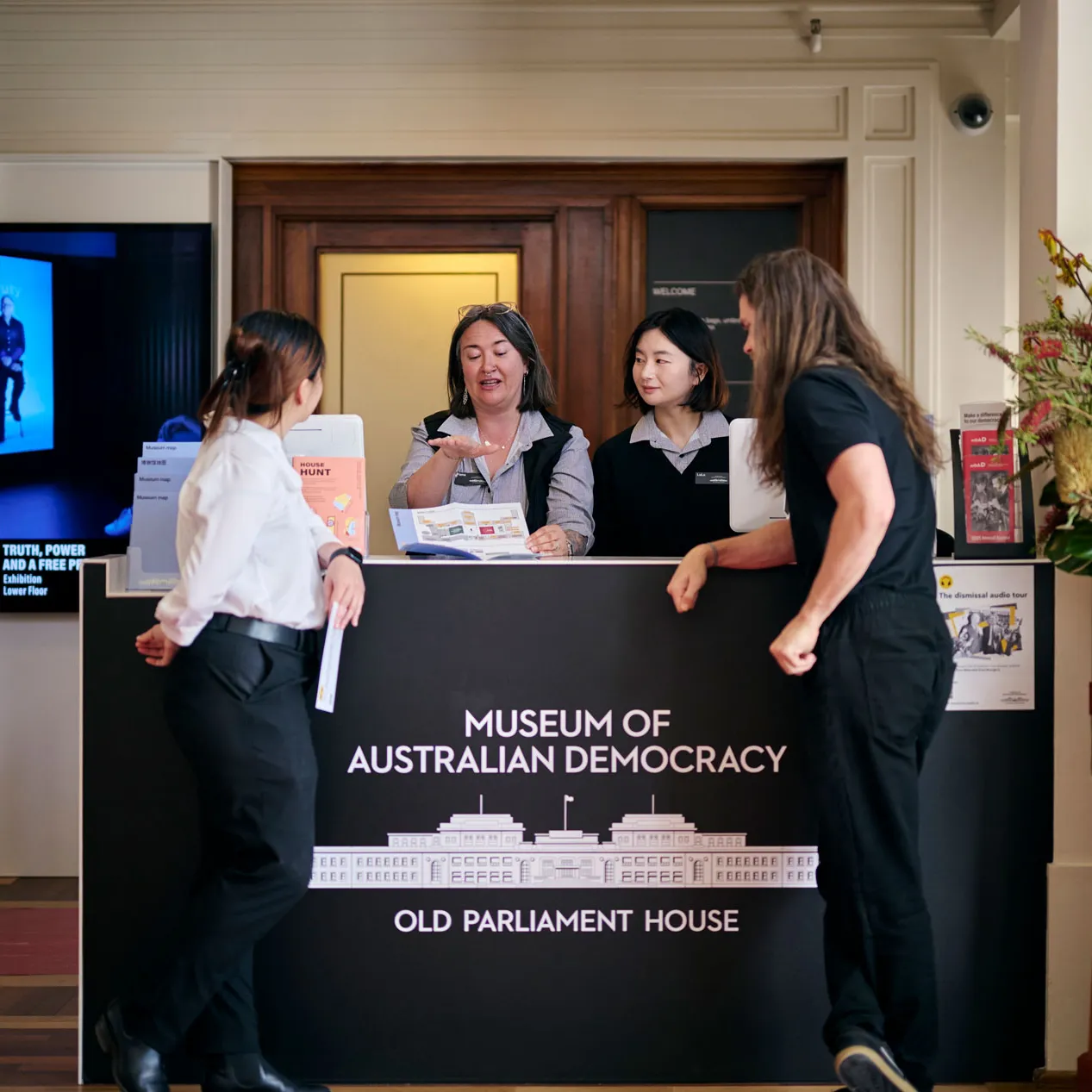
Map
Use this page to find the locations of exhibitions, heritage spaces, the cafe and visitor facilities.
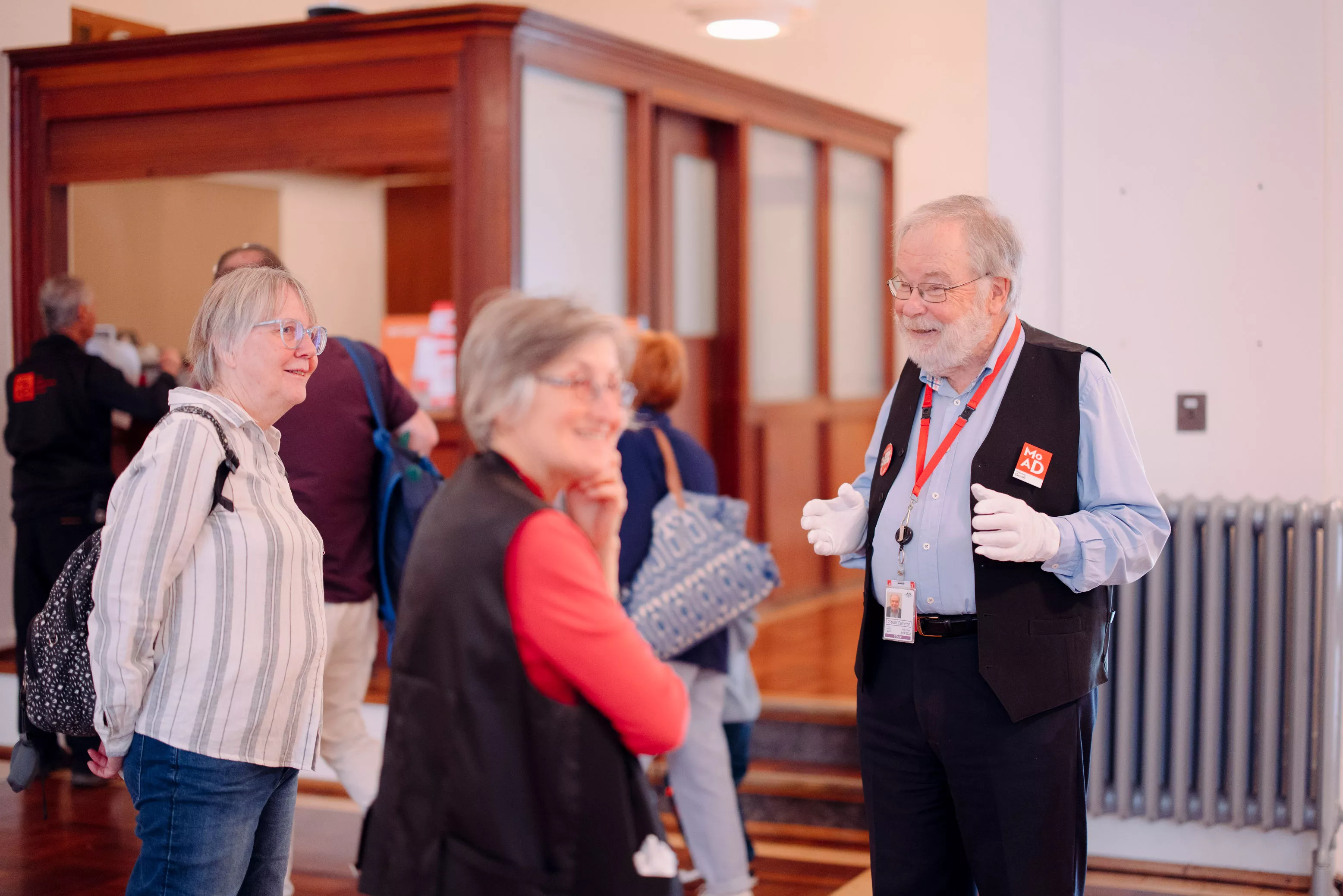
Volunteer
Our volunteers are ambassadors for MoAD, sharing the stories of Old Parliament House.
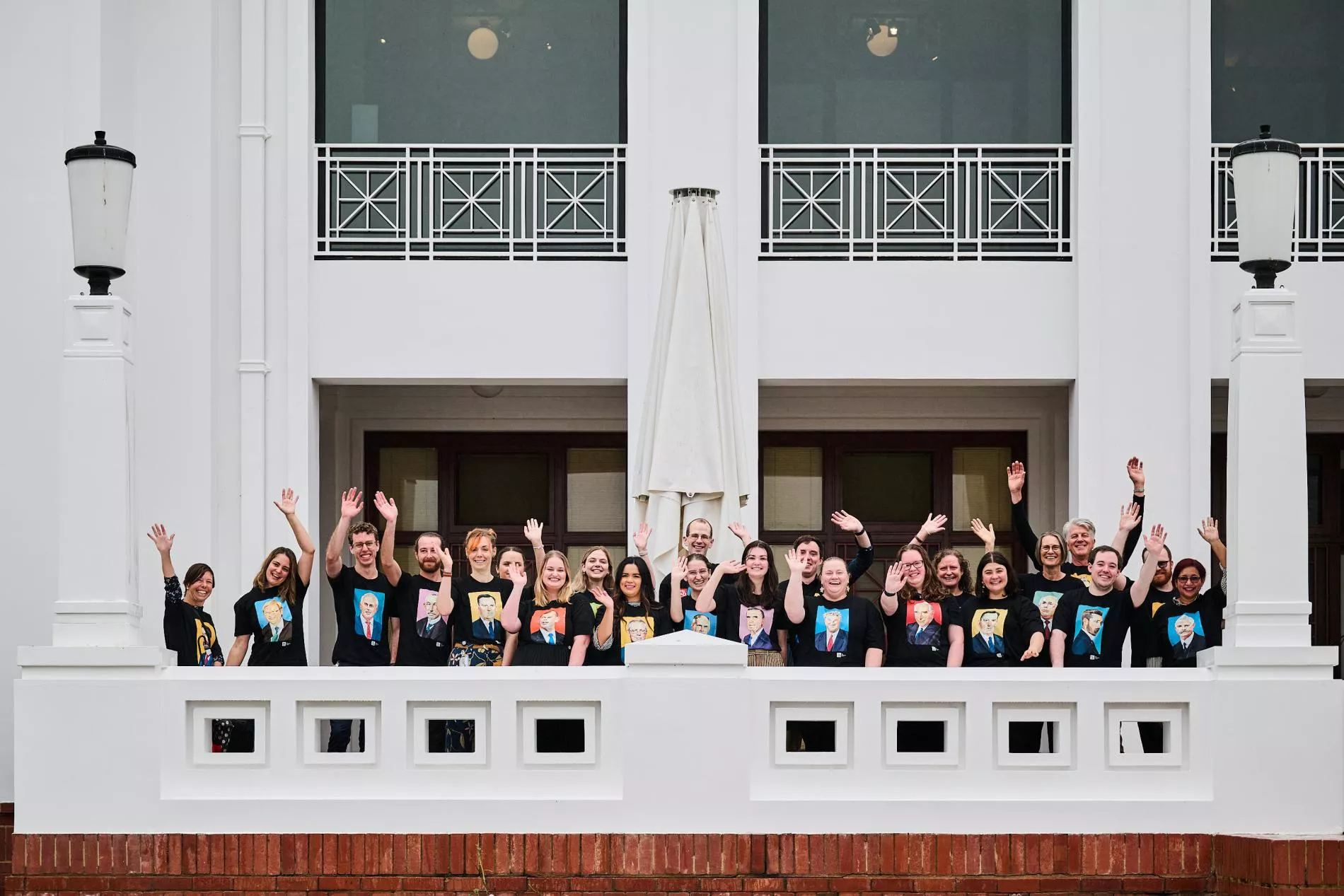
Careers
Join our team and help us tell the story of Australian democracy.
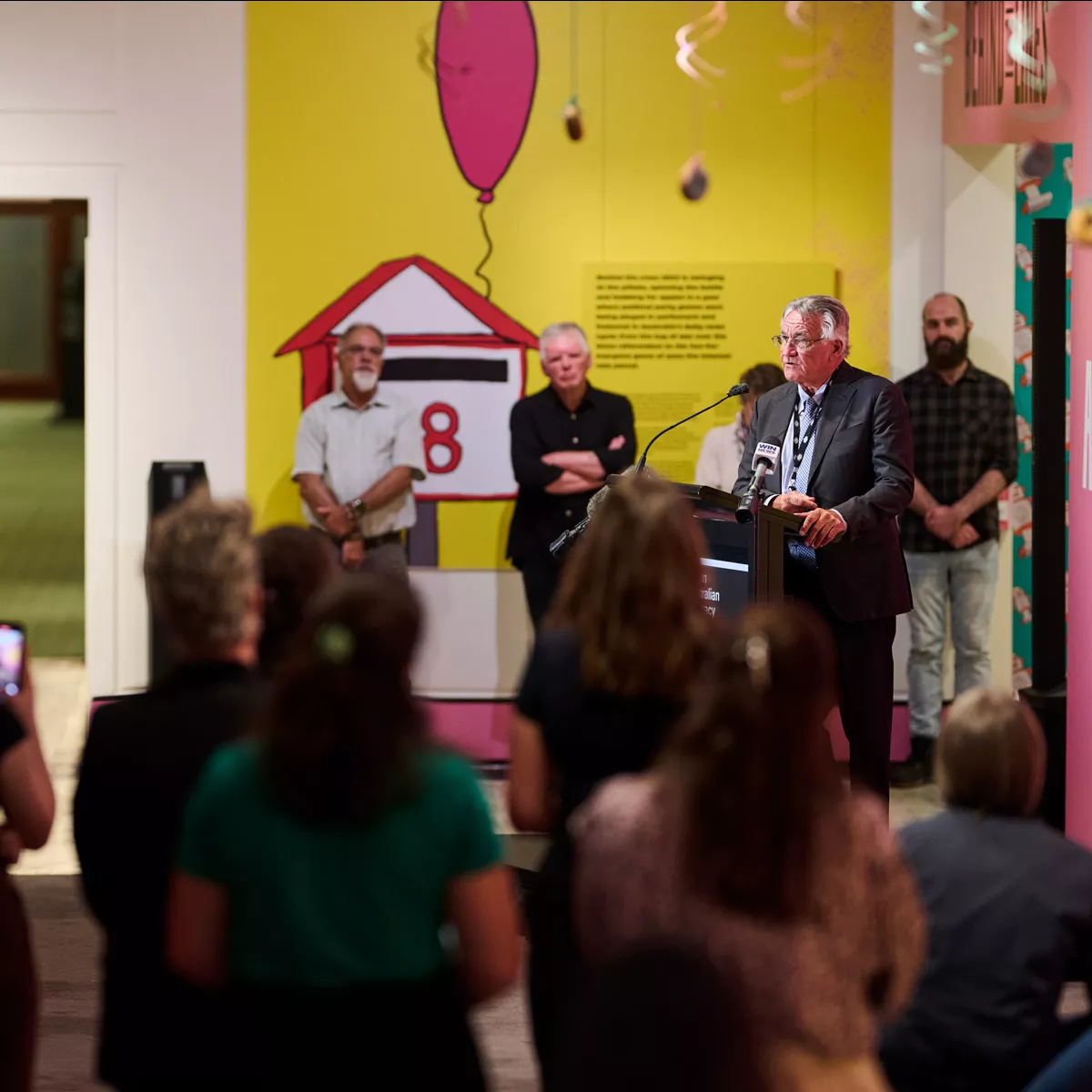
Media
Find our latest media releases, download publicity images and request interviews and film shoots.
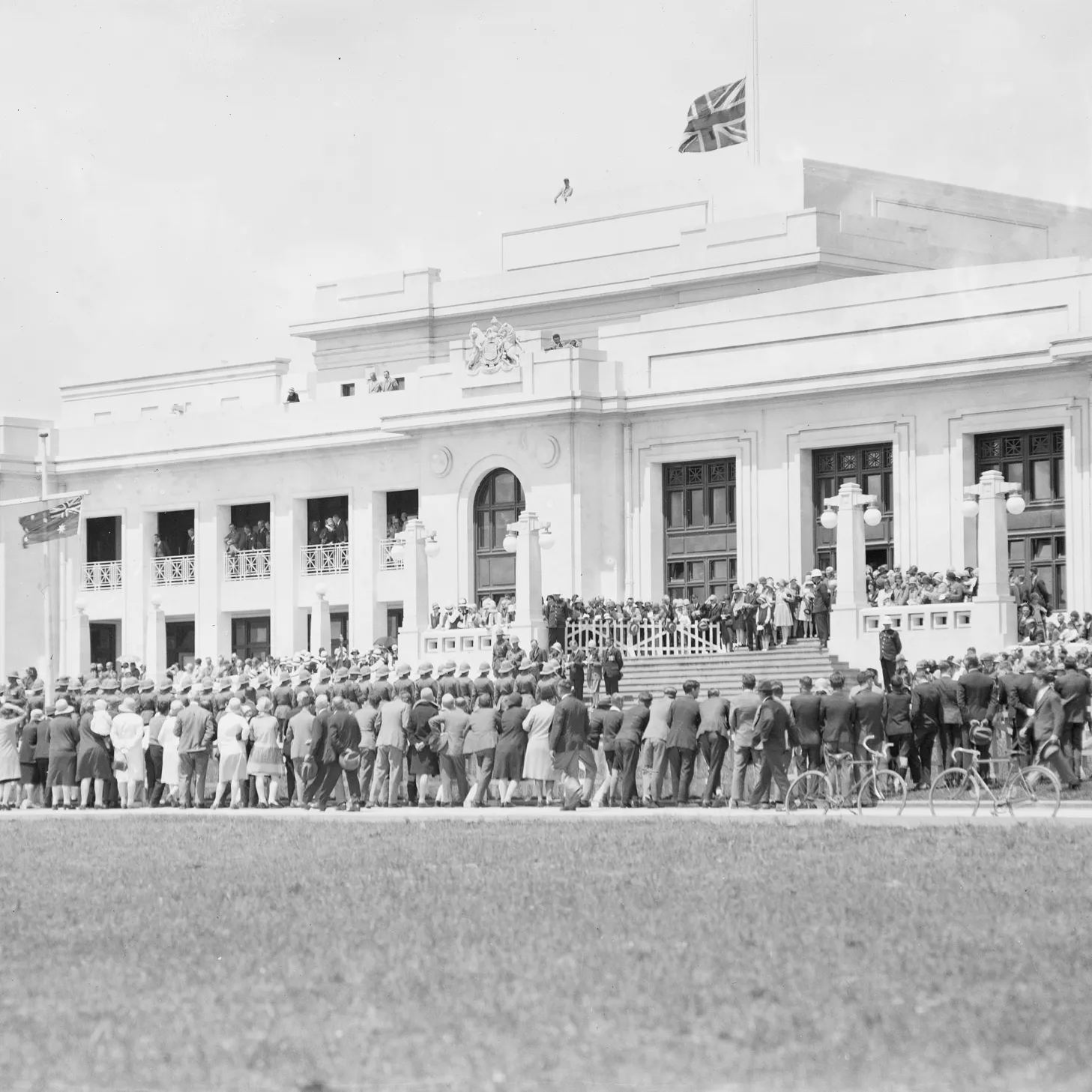
About Old Parliament House
Old Parliament House was the home of Australia’s federal government from 1927 to 1988.

